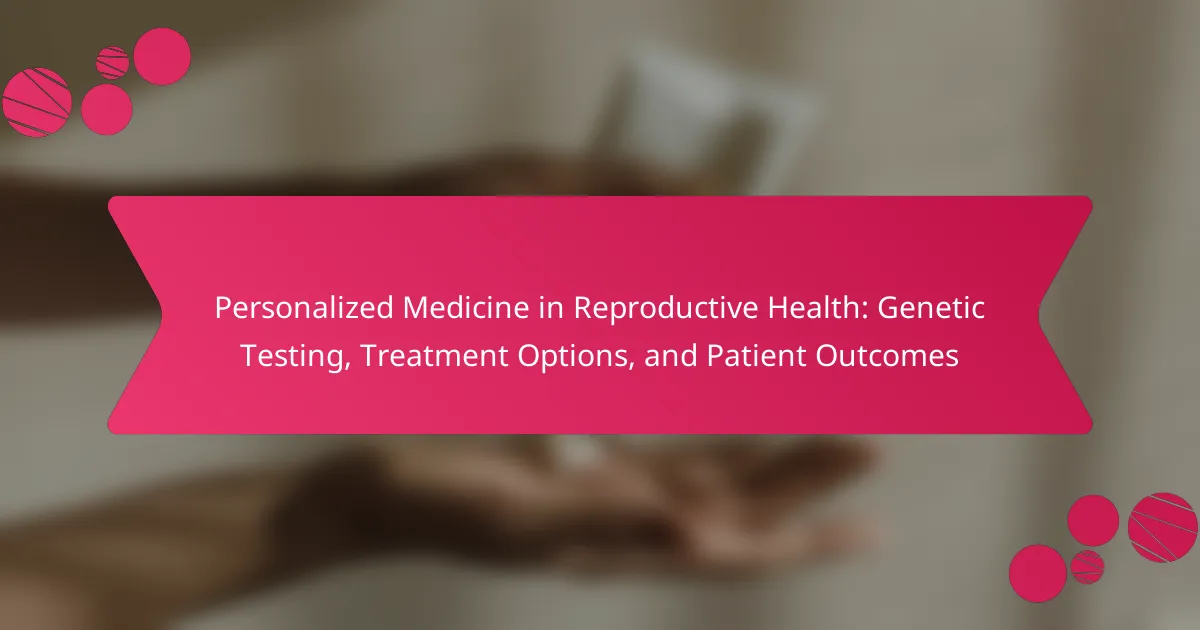Personalized medicine in reproductive health significantly enhances treatment effectiveness and patient outcomes by tailoring interventions based on genetic profiles. This approach includes genetic testing to identify mutations influencing fertility, customised treatment options like targeted medications and assisted reproductive technologies, and the impact of patient engagement on success rates. Ethical considerations and best practices for patients are also crucial in navigating this evolving field.
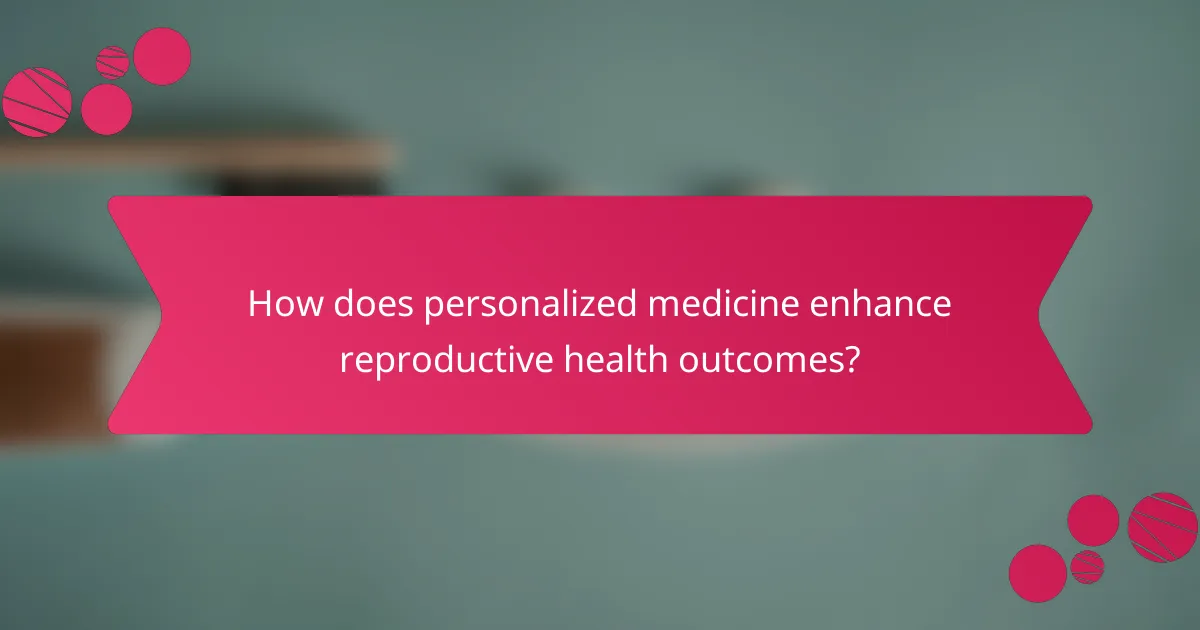
How does personalized medicine enhance reproductive health outcomes?
Personalized medicine enhances reproductive health outcomes by tailoring treatments based on individual genetic profiles. This approach improves the effectiveness of interventions and minimises adverse effects. Genetic testing identifies specific mutations or variations that influence fertility and response to treatment. As a result, patients receive customised options, such as targeted medications or assisted reproductive technologies, increasing the likelihood of successful pregnancies. Studies show that personalized strategies can lead to higher success rates in in vitro fertilisation and other reproductive health interventions.
What are the key benefits of genetic testing in reproductive health?
Genetic testing in reproductive health offers several key benefits. It enables personalised treatment plans, enhances understanding of genetic risks, and improves patient outcomes. This testing can identify hereditary conditions, allowing for informed family planning decisions. Additionally, it can guide the selection of assisted reproductive technologies tailored to individual needs.
How does personalized medicine address infertility challenges?
Personalized medicine effectively addresses infertility challenges by tailoring treatments based on individual genetic profiles. This approach allows for more accurate diagnoses and customised treatment plans, improving patient outcomes. Genetic testing identifies specific reproductive health issues, enabling targeted interventions. For example, patients with known genetic predispositions can receive specialised therapies that align with their unique needs, leading to higher success rates in conception and pregnancy. As a result, personalized medicine enhances the overall effectiveness of reproductive health strategies.
What role does patient education play in personalized reproductive care?
Patient education is crucial in personalized reproductive care as it empowers individuals to make informed decisions. Educated patients understand genetic testing options, treatment plans, and potential outcomes, leading to better adherence and satisfaction. This proactive approach enhances personalized medicine by tailoring care to individual needs and preferences. Additionally, informed patients can engage in discussions about unique attributes of their reproductive health, ensuring that treatment aligns with their specific circumstances. Overall, effective patient education significantly improves reproductive health outcomes.

Which genetic tests are most relevant for reproductive health?
Genetic tests relevant for reproductive health include carrier screening, preimplantation genetic testing, and non-invasive prenatal testing. These tests assess genetic risks and conditions that may affect fertility and pregnancy outcomes. Carrier screening identifies potential genetic disorders in parents. Preimplantation genetic testing evaluates embryos for genetic abnormalities before implantation. Non-invasive prenatal testing screens for chromosomal conditions in the fetus through maternal blood samples. These tests enhance personalised medicine approaches in reproductive health.
What insights can carrier screening provide for prospective parents?
Carrier screening provides insights into genetic risks for prospective parents, enabling informed reproductive choices. It identifies carrier status for specific genetic disorders, allowing couples to understand the likelihood of passing on inherited conditions. This knowledge can guide decisions regarding family planning, prenatal testing, and treatment options. For instance, knowing carrier status can lead to the use of assisted reproductive technologies to minimise risks. Additionally, it supports personalised medicine by tailoring interventions based on genetic profiles, ultimately improving patient outcomes in reproductive health.
How does preimplantation genetic testing impact IVF success rates?
Preimplantation genetic testing (PGT) significantly enhances IVF success rates by identifying viable embryos. PGT reduces the risk of genetic disorders and increases the likelihood of healthy pregnancies. Studies show that PGT can improve implantation rates by up to 50%. Additionally, it minimises the chances of miscarriage, offering a more personalised approach to reproductive health. As a result, patients benefit from tailored treatment options that align with their genetic profiles.
Which emerging genetic tests are gaining traction in reproductive health?
Emerging genetic tests in reproductive health include preimplantation genetic testing (PGT), carrier screening, and non-invasive prenatal testing (NIPT). PGT identifies genetic defects in embryos, enhancing successful implantation rates. Carrier screening detects genetic mutations in prospective parents, informing reproductive choices. NIPT analyses fetal DNA in maternal blood, providing early insights into chromosomal conditions. These tests improve personalised treatment options and patient outcomes, facilitating informed decision-making in family planning.
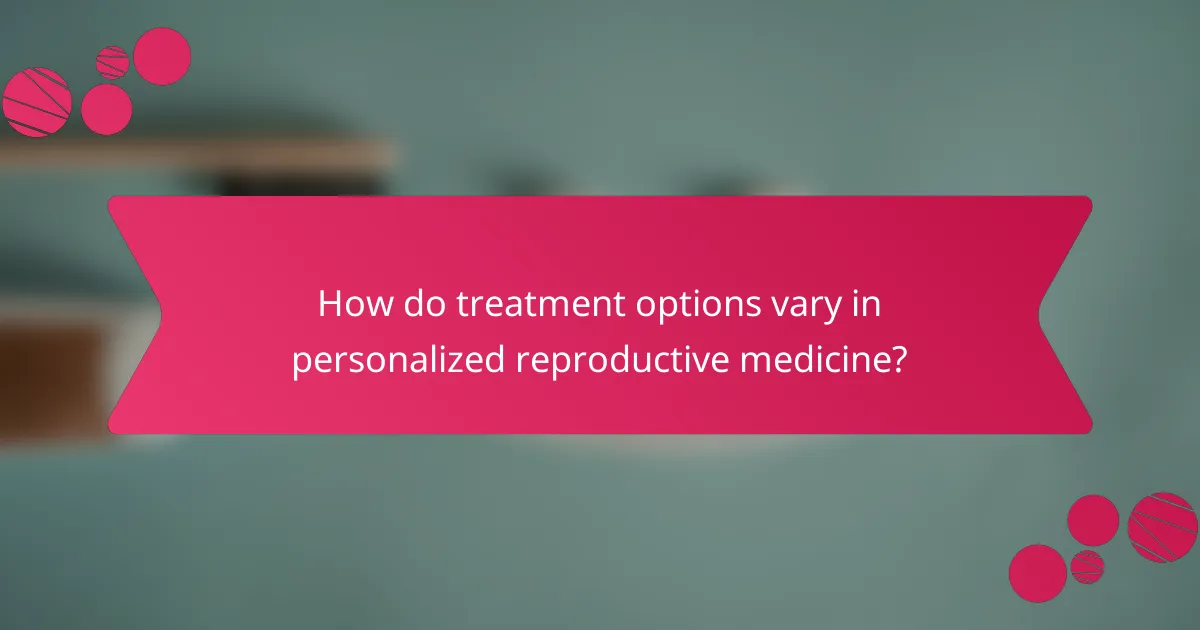
How do treatment options vary in personalized reproductive medicine?
Treatment options in personalized reproductive medicine vary based on individual genetic profiles and health conditions. Genetic testing informs tailored approaches, enhancing treatment efficacy.
For instance, in vitro fertilisation (IVF) protocols may differ significantly. Some patients benefit from preimplantation genetic testing (PGT) to select embryos with the highest likelihood of success. Others might require hormonal therapies adjusted to their hormonal levels, ensuring optimal response.
Additionally, unique attributes such as the presence of specific genetic markers can lead to rare treatment options, including customised medication regimens. As a result, personalized medicine in reproductive health significantly improves patient outcomes by aligning treatments with individual genetic and health profiles.
What are the common pharmacogenomics considerations in reproductive treatments?
Pharmacogenomics considerations in reproductive treatments include genetic variations affecting drug metabolism, response to medications, and potential treatment efficacy. Key factors involve assessing patient-specific genetic markers to optimise drug selection and dosing, thereby improving outcomes and minimising adverse effects. Tailoring treatment plans based on genetic profiles enhances personalised medicine in reproductive health.
How do personalized approaches tailor assisted reproductive technologies?
Personalized approaches enhance assisted reproductive technologies by tailoring treatment based on individual genetic profiles. This customisation improves patient outcomes and increases success rates. Genetic testing identifies specific needs, enabling targeted therapies. As a result, patients receive optimised treatment plans that align with their unique reproductive health profiles. Personalized medicine, through its focus on individual attributes, offers a transformative shift in reproductive health strategies.
What innovative therapies are being developed in reproductive health?
Innovative therapies in reproductive health include personalised medicine approaches that leverage genetic testing to tailor treatments. These advancements enhance patient outcomes by identifying specific genetic markers linked to fertility issues. For example, preimplantation genetic testing allows for the selection of embryos with the highest chances of successful implantation. Additionally, advancements in gene editing technologies, such as CRISPR, hold promise for addressing genetic disorders affecting reproduction. Personalised treatment plans based on genetic profiles can lead to more effective interventions and improved success rates in assisted reproductive technologies.
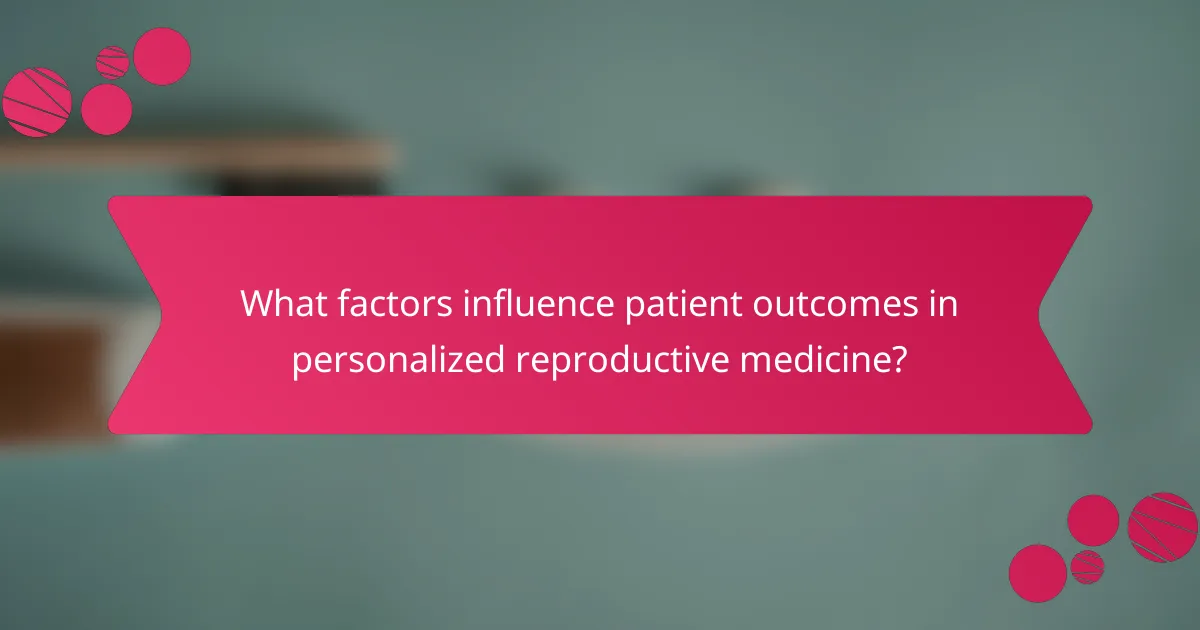
What factors influence patient outcomes in personalized reproductive medicine?
Patient outcomes in personalized reproductive medicine are influenced by genetic factors, treatment options, and patient engagement. Genetic testing identifies specific mutations and variations, leading to tailored treatment plans. Treatment options include assisted reproductive technologies and hormone therapies, which can be customised based on individual responses. Patient engagement, including adherence to protocols and emotional support, significantly impacts overall success rates. Additionally, unique attributes like age and underlying health conditions can further affect outcomes, emphasising the need for a comprehensive approach in personalised reproductive health.
How does genetic predisposition affect treatment efficacy?
Genetic predisposition significantly influences treatment efficacy in personalised medicine. Variations in genes can affect how patients metabolise medications, respond to therapies, and experience side effects. For instance, specific genetic markers can predict the success of hormone treatments in reproductive health. As a result, genetic testing allows for tailored treatment options that enhance patient outcomes. This approach minimises trial-and-error methods, leading to more effective and efficient care.
What are the psychosocial impacts of personalized reproductive care?
Personalised reproductive care significantly impacts psychosocial well-being by enhancing patient autonomy and reducing anxiety. It fosters a sense of control over reproductive choices, leading to improved mental health outcomes. Tailored genetic testing can provide clarity, decreasing uncertainty regarding hereditary conditions. As a result, patients often report higher satisfaction levels and better emotional resilience during treatment processes.
How do demographic factors shape patient experiences and outcomes?
Demographic factors significantly influence patient experiences and outcomes in personalised medicine for reproductive health. Factors such as age, socioeconomic status, and ethnicity affect access to genetic testing and treatment options. For instance, younger patients may prioritise different aspects of care compared to older patients, impacting their treatment decisions.
Additionally, socioeconomic status can determine access to advanced treatments, which may lead to disparities in outcomes. Ethnic background may also influence genetic predispositions, affecting the effectiveness of certain therapies. As a result, understanding these demographic factors is crucial for tailoring personalised medicine approaches to improve patient experiences and outcomes in reproductive health.

What are the ethical considerations in personalized reproductive health?
Ethical considerations in personalised reproductive health include informed consent, privacy of genetic information, and equitable access to treatments. Genetic testing can reveal sensitive data, necessitating robust privacy protections. Additionally, disparities in access can exacerbate existing inequalities in healthcare. Ensuring that all patients receive fair treatment options is crucial for ethical practice in this field.
How is data privacy managed in genetic testing?
Data privacy in genetic testing is managed through strict regulations, informed consent, and secure data handling practices. Organisations must comply with laws such as HIPAA, ensuring patient information remains confidential. Genetic data is often anonymised or de-identified to protect individual identities. Additionally, patients are informed about data usage, sharing, and storage before testing. This transparency builds trust and empowers patients to make informed decisions regarding their genetic information.
What are the implications of genetic information on family planning decisions?
Genetic information significantly influences family planning decisions by providing insights into hereditary conditions. Couples can assess risks of genetic disorders, enabling informed choices about conception and prenatal testing. Personalised medicine enhances reproductive health by tailoring treatment options based on genetic profiles, improving patient outcomes. Understanding genetic predispositions supports proactive health management and promotes healthier family planning strategies.
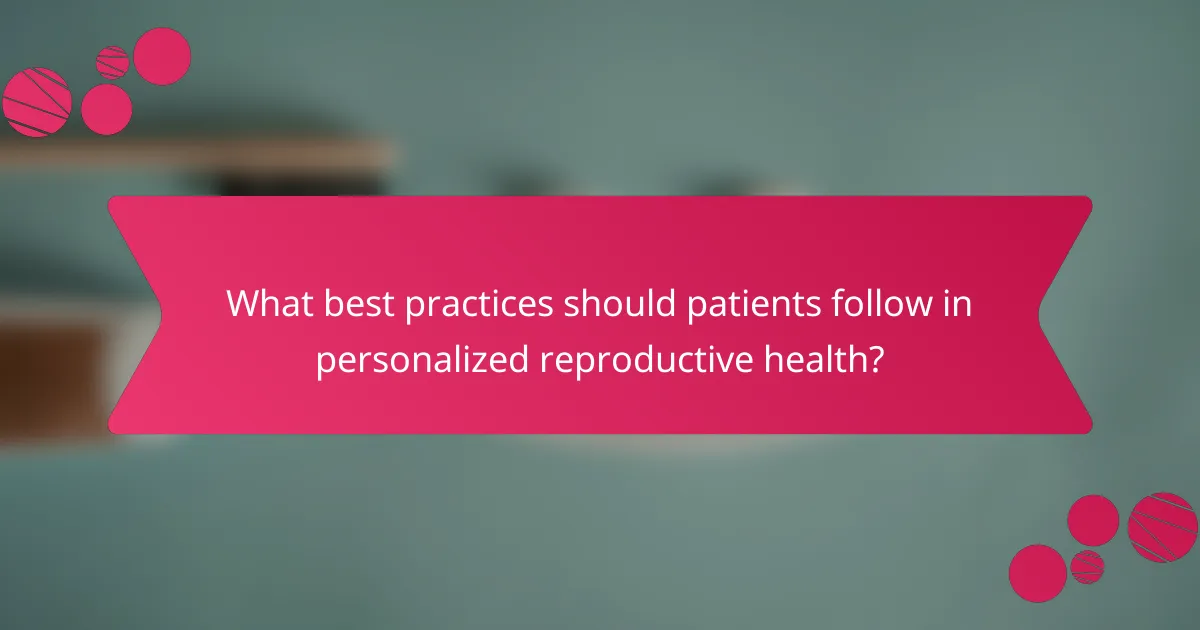
What best practices should patients follow in personalized reproductive health?
Patients should follow best practices that include open communication with healthcare providers, understanding genetic testing options, and actively participating in treatment decisions.
Establishing a strong relationship with healthcare professionals is crucial. Patients should ask questions and express concerns about personalised treatment plans.
Understanding the implications of genetic testing is essential. Patients should be aware of how results can influence treatment options and outcomes.
Active participation in decision-making enhances treatment effectiveness. Patients should weigh the benefits and risks of various treatment options in collaboration with their healthcare team.
How can patients effectively communicate with healthcare providers?
Patients can effectively communicate with healthcare providers by being clear, concise, and prepared. They should list their symptoms, concerns, and questions before appointments. Sharing relevant medical history and understanding treatment options enhances discussions. Active listening and asking for clarification ensure comprehension. Building a trusting relationship promotes open dialogue.
What common mistakes should patients avoid when considering genetic testing?
Patients should avoid several common mistakes when considering genetic testing. First, they often overlook the importance of consulting with a healthcare professional who specialises in genetics. This consultation can provide clarity on the implications and potential outcomes of testing. Second, patients may not fully understand the limitations of genetic testing, such as the possibility of inconclusive results. Third, some patients neglect to consider the emotional and psychological impact of receiving genetic information, which can influence their decision-making. Lastly, failing to inquire about privacy and data security can lead to concerns over how their genetic data will be used and shared.
What strategies enhance the success of personalized treatment plans?
Personalised treatment plans succeed through tailored strategies that consider individual genetic profiles and treatment responses. Integrating genetic testing enhances the precision of interventions, leading to better patient outcomes. Regular monitoring of treatment efficacy allows for timely adjustments, optimising care. Collaborative decision-making between healthcare providers and patients fosters adherence and satisfaction, ensuring that personalised approaches align with patient preferences and values.
